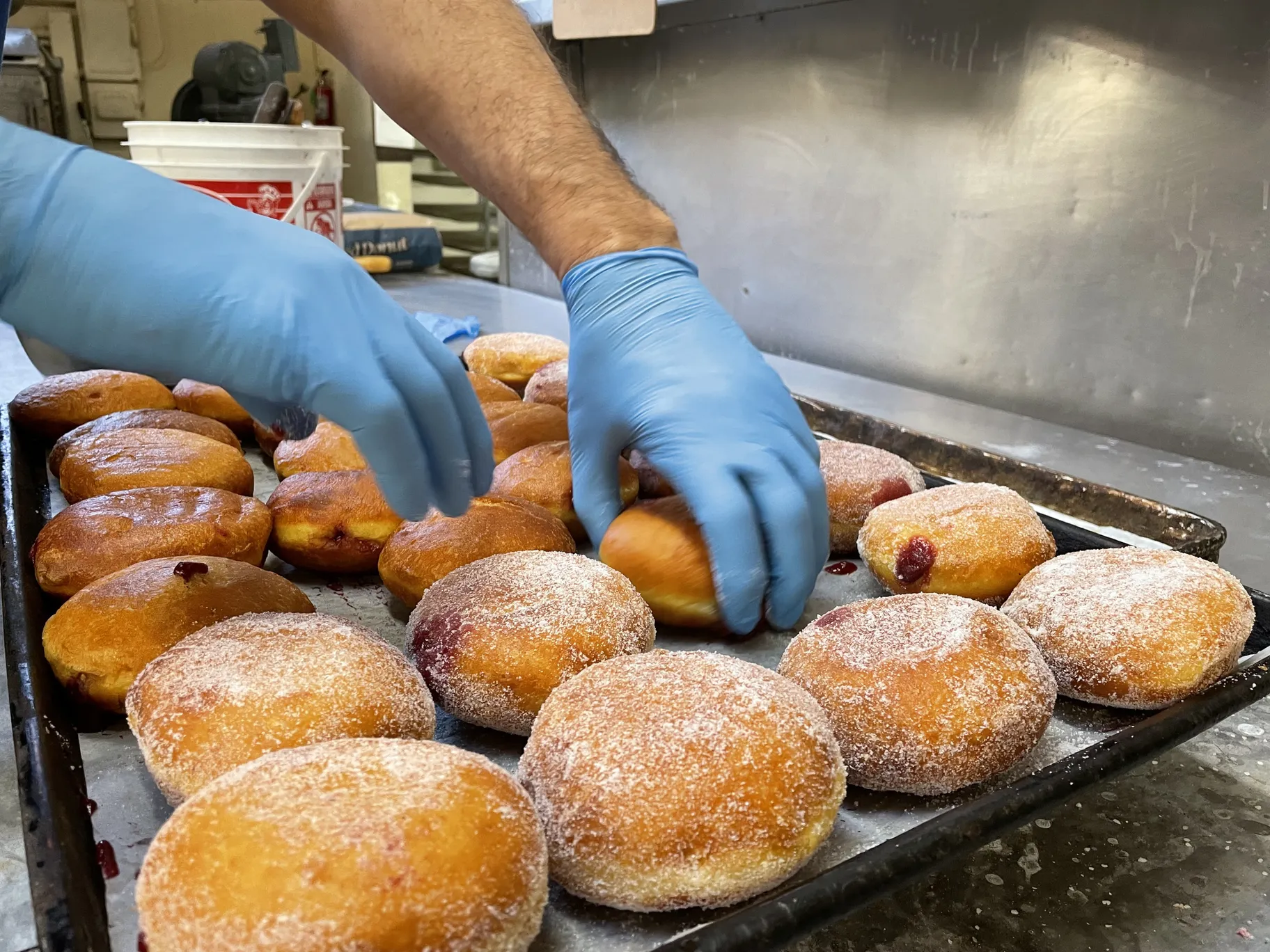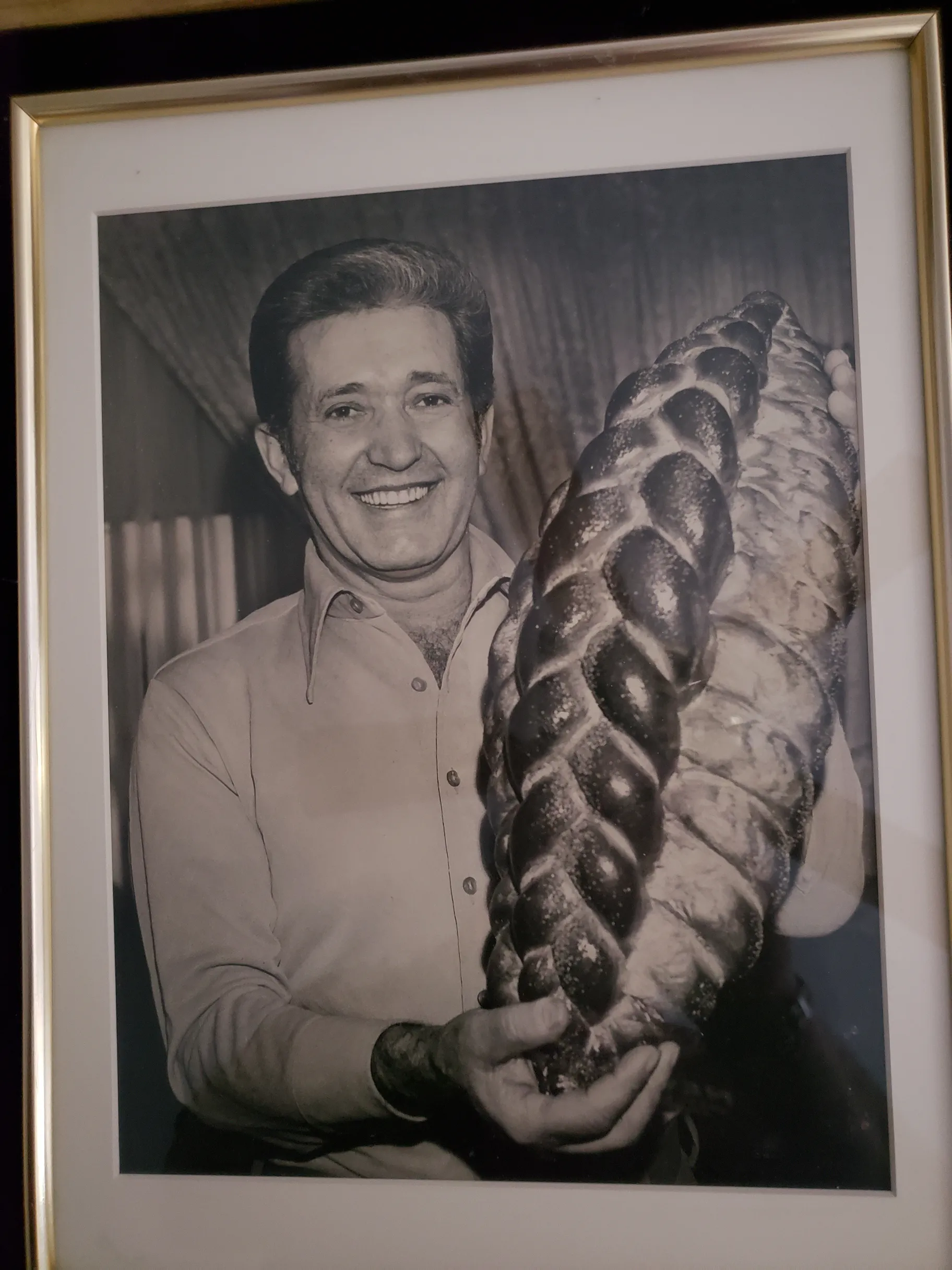Many of the original recipes at the Fairfax District’s Diamond Bakery were carried to Los Angeles from Europe by Jewish immigrants and survivors of the Holocaust, who launched the bakery in 1946. It became an LA institution, along with its neighbor Canter’s Deli, serving challah, rye bread, and rugelach to generations of Jewish families.
Until this month, when the business closed for good.
“It's part of people's Jewish cultural experience,” said owner Doug Weinstein on December 3, the bakery’s last day in business. “I hate being the one to [close] it.”
Miracles are top of mind for many Jews during Hanukkah, which commemorates a time more than 2,000 years ago, when a small amount of oil the Jewish people had to light their holy temple lasted eight days instead of one.
Weinstein calls it a miracle that the bakery stayed open for 77 years, and, he adds, there is another miracle: Like the oil, Diamond Bakery’s breads will last another day.
Weinstein has sold the original recipes to a wholesale bakery called Bread Los Angeles. They’re even taking Diamond Bakery’s 75-year-old rye bread starter.
“That culture has been going all along, so we're going to keep that going,” he says. “We're going to produce the corn rye and hopefully get it out there on a much larger scale.”

Doug Weinstein sugars jelly-filled donuts, called sufganiyot, at Diamond Bakery in Los Angeles’s Fairfax District during Hanukkah last year. The bakery closed on December 3. Photo by Robin Estrin.
When Diamond Bakery opened in 1946, the Fairfax District was on its way to becoming the heart of Jewish life in Los Angeles. Many Jews migrated to the neighborhood from Boyle Heights after the U.S. Supreme Court declared restrictive covenants unconstitutional. Those rules had prevented Jews and other minority groups from buying homes in the western parts of LA.
Two years after Diamond Bakery opened, in 1948, the famous Canter’s Deli, a Boyle Heights mainstay since 1931, reopened a block north.
Diamond Bakery’s first owners and workers were recent Jewish immigrants. The longest-tenured owners of Diamond Bakery were two couples – Sol and Arlene Lottman and Nate and Ruth Rubinstein – three of whom had survived the Holocaust. They owned the bakery from 1969 to 2019.
“This was a very Jewish bakery, with almost all Jewish bakers in the back,” says David Brand, whose father, Abram Brand, worked there for about 40 years. Brand says his father started at the bakery sweeping floors, and often worked overnight. “It was hard, intense labor,” his son says.
Brand’s father was also a Holocaust survivor and an immigrant from Poland.

Abram Brand, a Jewish Holocaust survivor, immigrated to Los Angeles and made a career at Diamond Bakery over four decades. Photo by David Brand.
In 2019, Ruth Rubinstein, a surviving owner of the two couples, retired, passing the business on to a son, says Weinstein. Soon after, the son decided to close, but a group of employees – Latino bakers, some of whom had worked there for decades – took over the business.
They faced many challenges, not least the COVID-19 pandemic, which decimated business.
Weinstein, a long-time customer and a baker himself, showed up in February of 2021 to buy a cheese pocket and a loaf of rye bread. “They recognized me, and I asked how it was going, and they said they were going to close,” Weinstein recalls. He called some friends to pool money together to buy the business, and the deal was done.
But the bakery continued to struggle. The Fairfax District was changing. Today there are still a handful of synagogues and a judaica store, and Canter’s Deli survives, but LA’s Jewish center has migrated west toward Pico-Robertson, and Fairfax is better known today as the heart of LA’s streetwear scene.
“I see young people who are going to buy $400 sneakers and $200 t-shirts, and they walk in and they look around, and they're not really sure where they are, or what this place is,” Weinstein said in an interview with KCRW last year. “I ask them, ‘First time here? Yes? Well, you've just walked into a bakery museum. We've been doing it for 76 years. You won't see this in too many other places. Let me give you a sample.’”
Slowly, businesses around the bakery shuttered and regular customers started to pass on. At the end of November, Weinstein announced that Diamond Bakery would close.
Besides fewer customers, “it's an 80-year-old building,” Weinstein says. “The plumbing is leaking, the electrical is old, the ovens need major repairs. In order for us to grow, we would have to refresh the whole bakery, and that's a lot of money.”
When word went out that the storefront would close, stories poured in through social media. People introduced themselves as second- or third-generation, depending on whether it was their parents or grandparents who first brought them to Diamond Bakery.
Annette Van Der Linde first came with her mom – also a Holocaust survivor – almost 60 years ago. “She always liked the babka – the chocolate babka. She loved the rye with black seeds,” said Van Der Linde, standing in the bakery on its last day in business. “She liked everything here.”
As her mom got older, and sick, Van Der Linde said Diamond Bakery became their special place. “I'd get her a couple treats and we'd have a cup of coffee, and it was just real special memories,” she said, adding, “I don't want to cry.”
David Brand, whose dad spent his entire career at the bakery, says he also bonded with his dad over steaming bags of Diamond Bakery breads in the early morning, after Abram Brand’s early-morning baking shifts.
“Those were the closest times that I had with dad,” David Brand said. “That bakery meant a lot. It was like a place where I could walk in the door, and it always felt like a bit of home.”
